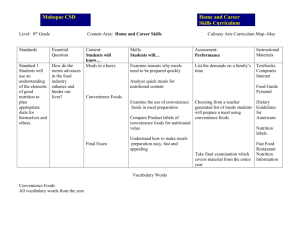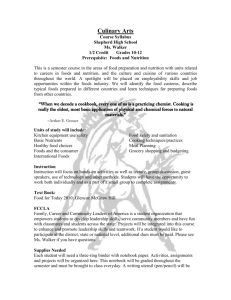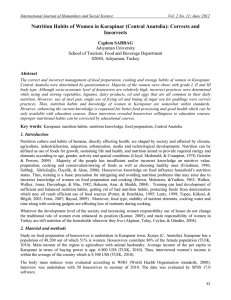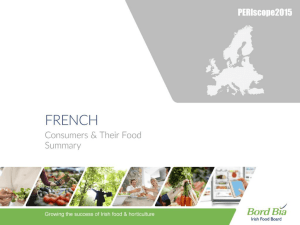2014 Citizens views of required food knowledge
advertisement
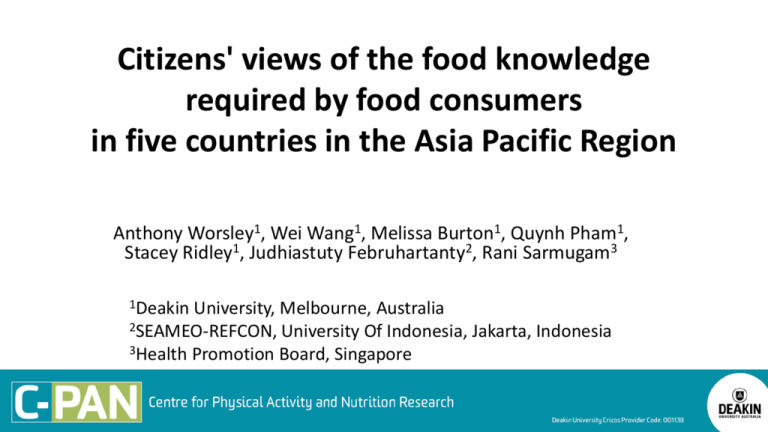
Citizens' views of the food knowledge required by food consumers in five countries in the Asia Pacific Region Anthony Worsley1, Wei Wang1, Melissa Burton1, Quynh Pham1, Stacey Ridley1, Judhiastuty Februhartanty2, Rani Sarmugam3 1Deakin University, Melbourne, Australia 2SEAMEO-REFCON, University Of Indonesia, Jakarta, Indonesia 3Health Promotion Board, Singapore BACKGROUND • Major economic and health changes are taking place in the Asia Pacific Region. • These affect people’s diets (e.g. Moodie et al. 2013, Popkin et al. 2012) • Rising middle class in many countries; successful policies requires civic engagement (Laverack 2010, Lobstein et al. 2013). • Little is known about food consumers’ views and experiences in these countries. • In particular, new school food curricular are required to equip young people to cope with consumerist societies. BACKGROUND & AIMS General aims of the Families and Food survey To describe: 1 Household food providers’ food & health behaviours & habits during the nutrition transition. 2 Their views of food marketing, causes and prevention of obesity, retailing & consumption, and food policies. Specific objective To examine household food providers’ views of the key food knowledge and skills required by food consumers. Our previous work • Examined ‘experts’ views of the food knowledge and skills required by school leavers – qualitative study. • Examined lay people’s views of essential food knowledge and skills in two national surveys in Australia in 2012 and 2013. • Part of Taxonomy of food knowledge grant from Australian Research Council, examined nutritional, safety, environmental and ethical food knowledge. • We based our items in the Asia Pacific Families and Food survey on items derived from this earlier work. • Most research in the ‘knowledge’ area is linked to ‘nutrition’ or food safety knowledge; lay persons rarely asked for their opinions. Some hypotheses 1 Country differences & Nutrition transition: Populations new to ‘global markets’ will be less aware of dangers to nutrition status. Australia & Singapore further into transition than Vietnam, Indonesia and Shanghai Therefore, respondents from A&S will emphasize ‘coping with marketing’ skills more than those from V.I.S. 2 Personal values: Self and communitarian values & conformity-security values Respondents with stronger Communitarian values (Schwartz POV) will be support a wider range of skills and knowledge. positively linked to pro health & nutrition views. 3 Demographics: In line with literature, Older people and women more likely to support a wider range of knowledge and skills Some Hypotheses 4 Consumerism: Ownership of electronic devices, surrogate index of ‘consumer society’. The more electronic devices owned, the less support for food knowledge and skills. METHODS The samples • Online survey administered by Global Market Insite using their consumer panels. • Approx. 800 respondents in each of Indonesia, Melbourne, Singapore, Shanghai, Vietnam. • Respondents were household food providers, representative of main age groups in each country; approximately 40% were men. • Samples were highly educated (middle class). METHODS Procedure • Respondents contacted by email during December 2013 and January 2014. • Strong data quality checks e.g. rotation of items to avoid order effects. • Points incentives redeemable for small cash amounts. • Quota (convenience) sampling METHODS The Questionnaire Several sections composed of closed and open ended items (as noted in Background). For this presentation: a) Respondents were asked: How important are the following types of food knowledge and skills for today’s consumers to enable them consume healthy foods? Then followed a list of 18 items based on our previous work (see Results) Scale: Five point Not Important to Very important. a) • An open-ended question: In your own words, what food related knowledge or skills do you think everyone needs in order to be active, healthy food consumers? Respondents wrote as little or as much as they wished. ratings 4+5 (definitely) reported here Data analysis Quantitative data: Descriptive statistics, confirmatory factor analysis, hierarchical multiple regression, structural equation modeling (ongoing). Qualitative data: Content (Wordtag) and basic thematic analyses (WordSift) RESULTS: Quantitative findings Food providers’ views of the importance of types of food knowledge and skills for today’s consumers (% Important, ratings 4+5) Food providers’ views of the importance of types of food knowledge & skills Note: Statistically significant country differences on all items, p<0.01) Note: Statistically significant country differences on all items, p<0.001 Results of Confirmatory Factor Analysis Associations between the Importance of food knowledge/skill and the covariates The importance of food knowledge and skills was linked Positively to EQUALITY values (beta = 0.31) Positively to support for HEALTHY FOOD PROMOTION (0.22) Was higher in Shanghai, Vietnam and Indonesia than in Melbourne (0.19, 0.16, 0.15) Was higher among women than men 0.078 and older people (0.06) Positively to TRADITION (0.057) and HEDONISM values (0.4) Higher among people with a CHILD AGED 13-18 years (0.03) Negatively to the number of e-ENTERTAINMENT devices (-0.04) Negatively to support for ALCOHOL marketing (-0.05) and marketing of UNHEALTHY FOODS (-0.09) Points to note • Top of the list: health effects, safety, nutrient composition, cooking skills, meal planning, regulation. • Lower priority on system issues: marketing & advertising, animal welfare, ethics, how food is grown, budgeting skills , food processing Should there be more emphasis on knowledge of the food system? Regional differences Many differences, for example: Melbournians and Singaporeans lowest on: health effects, nutrient composition, safety, food supply security, food processing, environmental impact, animal welfare, ethics. Is this effect of well regulated food markets and ‘sheltered’ consumers (e.g. food scares)? Importance of psychographics and regions • Equality values and support for healthy food promotion • Regional differences – Melbournians and Singaporeans tend to be less supportive of food knowledge than Vietnamese , Indonesians and Shanghainese. • Women and older people more supportive of food knowledge RESULTS: Qualitative data These are preliminary data. Full thematic analyses required after translation of non English speakers’ responses The following examples refer to comments made by Melbournians. TagCrowd used to compute word frequencies and WordSift to find statements associated with key words. Frequencies of words from TagCrowd Top words food (373) cook (141) healthy (167) eat (113) meals (88) prepare (73) basic (50) ‘Food’ examples How to handle food at all stages. Understand labels the dangers of eating wrong foods. To learn more about fast food and soft drinks. To go back to natural foods. Eliminate processed foods from their diet. ‘Eat, eating’ examples Always have something healthy to eat Just try and eat as much healthy foods as u can Know what to eat what is good Eat less unhealthy food and do more exercise ‘Prepare’ examples What is seasonal and how to prepare it. Information about food shopping and budgeting to prepare good home cooked meals Cooking skills to prepare simple basic healthy meals How to prepare quick easy meals at home that is quicker to cook than going to a take away Cook, Cooking Cooking skills to prepare simple basic healthy meals. Cooking classes should be mandatory in schools for setting a foundation for future. How to cook healthy and nourishing meals with little ingredients. Basic cooking skills are all that are needed to produce a cheap, healthy meal ‘Sugar’ examples To be made aware of the effects high salt, sugar, fatty foods have on the body as opposed to healthy foods. Water and sugar content of foods. Food basics know what are you eating how much fat salts and sugars that are in super market processed foods that we buy. Basic cooking skills a reminder of portion sizes and how bad sugary drinks are for us. Conclusions • Much agreement about important knowledge for consumers; similar to traditional home economics curricula. • Regional differences suggest that people in developing economies may be more interested in consumer education. • Psychographics may be more important predictors of desired food knowledge than demographics. • Use of open answer questions may be practical and highly informative in surveys REFERENCES International Food Information Council (IFIC) (2013). Food and Health Survey 2013. http://www.foodinfo@ific.org. Hardus PM, van Vuuren CL, Crawford D and Worsley A (2003). Public perceptions of the causes and prevention of obesity among primary school children. International Journal of Obesity, 27, 1465–1471. doi:10.1038/sj.ijo.0802463. Laverack, G 2010, Influencing public health policy: to what extent can public action define the policy concerns of government? Zeitschrift für Gesundheitswissenschaften, 18 (1), 21-28. Lobstein, T, Brinsden, H, Landon, J, Kraak, V, Musicus, A, Macmullan, J (2013). INFORMAS and advocacy for public health nutrition and obesity prevention. OBESITY Reviews, 14 (Supp. 1), 150-156. Moodie, R, Stuckler, D, Monteiro, C, Sheron, N, Neal, B, Thamarangsi, T, et al. (2013). Profits and pandemics: prevention of harmful effects of tobacco, alcohol, and ultra-processed food and drink industries.’ Lancet, 381, (9867), 670-679. The Team Dr Wei Wang Dr Rani Sarmugam Dr Judhiastuty Februhartanty Ms Quynh Pham Ms Melissa Burton Ms Stacey Ridley Funding: Australian Research Council (DP1094493) & Deakin University THANK YOU! tonyw@deakin.edu.au Support for bans and taxes Self oriented values Associated factors Avoid calories OzSing Eat less Abstract barriers Total R sq. = 10.4% Environmental barriers 0 0.05 0.1 0.15 Std. Beta 0.2 0.25 Support for Nutrition Promotion Eat breakfast, protein, shopping list Total R sq. = 40% Associated factors Fast food, no PA OzSing vs Others Avoid calories Conformity-security values Other oriented values 0 0.05 0.1 0.15 0.2 Std. Beta 0.25 0.3 0.35
